- Home
- Colleen Gleason
The Clockwork Scarab s&h-1 Page 12
The Clockwork Scarab s&h-1 Read online
Page 12
“Yes, for real. And, like, could you just call me Dylan? Or Eckhert, as my friends do? I can’t deal with this Mr. Eckhert stuff.”
“Of course, Dylan,” Miss Adler said, seeming to recover herself. “If it will make you feel more comfortable.”
“Mr. Eckhert traveled here with the help of an illuminated scarab on a statue of Sekhmet. At just about the same time Miss Hodgeworth was being murdered. It cannot be coincidence that those two events happened concurrently.”
“Of course not,” she agreed.
“He was arrested trying to break into the museum last night, presumably to try and find the Sekhmet statue so he could determine how to return home. I was able to get him released on bail, and we’ve come directly from the jail.”
“I did hear about the attempted break-in. And what a traumatic experience you’ve had.” Miss Adler still wore an expression of shock, and I couldn’t blame her. After all, I’d had more than a day to come to the conclusion . . . and yet, I still couldn’t fathom the concept. Time travel? “Perhaps you’d like to—er—wash up a bit, Dylan?” she suggested. “I’m certain we could obtain some clean clothing for you as well.”
When our guest accepted the offer with alacrity, Miss Adler added, “Mina, perhaps you’d take a moment to read this passage while I show Dylan to a washroom.” She gestured to the open book on her desk. “I suspect you’ll find it enlightening.”
As they left, I settled myself in her position at the desk and took note of the large book. The pages were old and yellow, held together not by the stitched leather binding we find on current publications but by large, looping leather thongs. The text was cramped and faint, and simple sketches broke up the blocks of prose. The words were handwritten rather than typeset and in a variety of colors and styles. The mechanical device on which Miss Adler had mounted the tome not only provided light, it also magnified the text and held the book open to the proper page.
The line drawing of a lion-headed woman drew my attention. Beneath it, in flowing, fading text, was a poem or song. It took me a moment to decipher the cramped, ornate entry, and even then, I passed over some words and phrases when they were blotched or unreadable.
Sekhmet, the Goddess of Death, shall be called back to life.
Shall endow Her strength and power upon those deserving.
Gather Her Instruments, meld them whole ——
With the purest of sacrifices shall find the — power.
For the Power of Sekhmet shall rise in vengeance
For the weak and restrained.
A little shiver went down my spine. Last night, the Ankh had referred to “the Power of Sekhmet.”
The day is nigh, the Ankh had said.
What were the instruments?
Gather Her Instruments, meld them whole . . .
I examined the pages, trying to find further reference to the instruments or to the Power of Sekhmet. From what I was able to glean from the book, it seemed to be a collection of Egyptian and Sumerian legends and writings.
After carefully turning one more crisp, browned page, I found an entire leaf devoted to them: The Instruments of Sekhmet: Her Scepter. Her Diadem. Her Cuff. Her Sistrum.
There were drawings of them all. First, the tall scepter with a lion’s head. A detail in the drawing indicated a green gem for the feral feline’s eye, and its long, smooth, mane running the entire length of the staff.
Sekhmet’s diadem appeared to be a delicate, filigreed object—not at all Egyptian in appearance. It looked as if it were made from slender golden curves and twists, but upon closer examination, I realized it too depicted a lion. A feminine snout at the front of the diadem was combined with the leonine mane that curled and curved in an ethereal shape that would hug the crown of the head.
The cuff was a smooth, flat, metal band that enclosed the wrist. The drawing was faded and mottled, making it difficult to see much detail. With the help of the magnifyer and a bit of patience, I was able to discern that the fastener which held the bracelet closed was made of two almond-shaped feline eyes.
The sistrum, a small musical instrument, resembled an ankh in the drawings: it was cross-shaped and had a loop in place of the top, upright bar.
The door to the office opened, and in walked Miss Adler, accompanied by Dylan. He was clean, shaved, and dressed in proper English clothing, with the exception of gloves. I didn’t bother to ask how she had arranged it; there was no sense wasting time on such trivial details.
He looked very British, yet he still seemed . . . different. With his long hair flipping up gently in random places and the slender, blue rubber bracelet he wore, along with the manner in which he stood and moved, he exuded foreignness. He reminded me of a cat reluctantly dressed up in child’s clothing—subdued for the moment, but not in his natural habitat. Not terribly different from how I’d felt at Lady Cosgrove-Pitt’s ball, dolled up and thrust into an unfamiliar environment.
Shifting under my regard, Dylan gave me a sort of lopsided smile and tucked a finger inside the collar of his shirtwaist, tugging sheepishly at the neckcloth.
“I trust you found the reading relevant?” Miss Adler said, redirecting my attention.
“Indeed. I have much to tell you, for this makes what I learned last night clearer.” I launched into an explanation of the events surrounding the Roses Ball and our unexpected adventure. It was with great effort that I managed to keep an accusatory tone from my voice as I described Miss Stoker’s foolhardy actions—from leaving me behind at the top of that long, dark, subterranean flight of stairs, to her bold accusation of the Ankh.
“Fortunately we were able to escape, thanks in part to Miss Stoker’s physical capabilities,” I said, keeping the begrudging tone from my voice with effort.
“The leader’s name was the Ankh?” Miss Adler said.
“Yes. Clearly nothing more than a symbolic name. Ankh, of course, means ‘life’ and is a common icon in Egyptian culture.” I could have lectured further, but Miss Stoker wasn’t present, and surely Miss Adler was already familiar with the symbol.
“And you weren’t certain of the individual’s gender?” she asked.
“Even employing my powers of observation, I could draw no clear conclusion. There were moments when she seemed feminine, and others when I was certain he had to be a male. But aside from that, the most important thing we’ve learned is that there is indeed a society related to Sekhmet. I neither saw nor felt anything that indicated danger to me or anyone else, with the exception of when Miss Stoker drew attention to herself and they attempted to detain us.”
What had also occurred to me, but I chose not to mention, was that the Ankh had seemed to easily make the connection of me to Miss Stoker—simply because we were standing next to each other.
“Thus, if I’m to revisit the Society of Sekhmet, which I intend to do, I must do so clandestinely.” I went on to repeat—verbatim—what the genderless speaker had said during the meeting. “The Ankh promoted female independence, but not once did she speak of the right to vote.”
“So it isn’t merely a suffragette group,” said Miss Adler. “But something more . . . and something that is endangering young women. I will report to Her Royal Highness this evening.”
“The Ankh spoke of Sekhmet helping the young women. She said ‘I, along with the Power of Sekhmet, will help you gain control of your lives in a manner such that women have never done.’ The Power of Sekhmet. That same phrase is notated here in the book. And the Ankh spoke of women being repressed and controlled . . . and in the book, there is reference to the goddess’s power rising up in vengeance for the weak and restrained.”
“I believe,” Miss Adler said, picking up her spectacles, “we have quite a lot of research to do. We must find out more about the Instruments of Sekhmet as well as this implication that she can be called back to life.”
A week ago, I might have found such a conversation ludicrous. Calling a goddess back to life? Absurd. But the young man standing across the chamber f
rom me had opened my eyes to the impossible becoming probable.
I turned to Dylan. “It would be helpful if you showed us where you woke and where the statue of Sekhmet was when you originally discovered it. Your journey and its disappearance—and perhaps this entire case—must be connected.”
My new friend agreed, and we left the chamber. Miss Adler elected to remain behind, explaining, “I have a variety of resources that could assist us—papers, books, scrolls, and other antiquities. I’ll begin to gather them.”
Despite the fact that he’d traveled more than a century back in time, Dylan seemed to know his way through the museum. It was just after closing, so the exhibit halls were empty and silent except for the low rumble of distant cogworks and a sibilant hiss of steam. The lamps had been turned off and a smattering of external light filtered in through high windows.
As we approached the trio of Graeco-Roman salons, I observed the way a sliver of sun made a triangular highlight over the breast of the Ostian Venus. We walked through the first salon, past elegant statues of the Muses, Mercury, and the goat-eared Satyr.
Our footsteps made soft padding sounds as we passed through a little transept approaching the long, narrow Egyptian Gallery. This was where the famous Rosetta Stone, among other antiquities, was displayed. The stone itself was on a circular dais, and a revolving glass enclosure had been erected around it for safekeeping.
“They’ve placed an entire glass case around it now—er, in my time,” Dylan commented as we walked past.
He led me through a darker salon and then to a small stairwell. This area of the museum was cluttered and dusty, with crates and boxes stacked in haphazard fashion. Presumably, it was one of Miss Adler’s duties to unpack, arrange, and catalog the contents.
I have an excellent sense of direction, and even after several turns and descents, I still knew our whereabouts in the museum. So when Dylan paused outside a small, dingy room, I recognized that we were on the west side, two levels below the Assyrian Basement.
“In here,” he said.
I pulled the slender illuminator from my reticule and flipped its switch. The beam of light created a large yellow circle that danced on dark gray walls and a low ceiling. A collection of small objects—a knee-high statue of Bastet, a vase missing a large chunk, a piece of rock, and other pieces of rubble and dirt—littered the floor. Some long-tailed rodent moved in the shadows, darting into the corner.
I spun the dial to set the illuminator on its brightest level and walked into the chamber.
“The statue was there.” Dylan pointed to the far corner.
Bringing the light down with me, I hunkered on my hands and knees as I’d seen my uncle do at various crime scenes. This is much more difficult when you are a female, dressed in layers of crinolines and skirts, along with a restrictive corset. Nevertheless, I managed to do so with a modicum of modesty and commenced to examining the floor.
Faint scrapes on the stones—something heavy had been moved.
Clean, no dust or dirt—it had been moved recently.
Suddenly, a strange noise blared into the silence. It sounded like nothing I’d ever heard before. A sharp, high, screeching sound that might have been attempting to be music.
Dylan, who’d been standing off to the side watching in fascination, jolted to attention. His eyes wide, he began to fumble through his waistcoat and then his outer coat and in his agitation and excitement, the sleek “telephone” erupted from the depths of a pocket and tumbled onto the ground.
He ducked to the floor and snatched it up, but by then, the noise had stopped. “Oh my God,” he said, staring at the object as if he’d never seen it before.
The device had come to life—it was illuminated and I was close enough to where he was kneeling that I could see tiny words on the front of it.
BenBo text (3)
Jillian text (5)
Flapper missed call
“I’ve got two bars,” he exclaimed, looking around the small, dark space, then down at the shiny telephone. “How can I have bars? One bar. Now I only have one. How the hell can I have b—they’re gone!” He stared at the device, shaking it, jabbing at it with his finger, bolting to his feet to point it in different directions. “They were there a minute ago. Did you see that? There’s no way. No way.”
“What is it? What happened?” Leaving the illuminator on the floor, I gathered up my skirts and pulled to my feet.
I understood little of what he was talking about, but his emotions—excitement, disbelief, and hopefulness—were obvious. And then they gave way to despair. I’d never seen anyone with such an expression of bewilderment, hope, and sorrow.
“For a minute,” he said, “for just a minute I was . . . somehow . . . connected with the future. My future.”
Silence reigned as we both stared at the device.
I heard him swallow hard, and he looked away. His knuckles were white and his jaw moved, shifting from side to side. “I have to figure out how to get home,” he whispered. “My mom and dad must be going crazy.”
“Dylan,” I said, groping for words I didn’t have. Trying to manage emotions I didn’t know. I didn’t know how to act, to even be a friend. But at that moment, I wanted that connection. It wasn’t just curiosity about who he was and from where he’d come. It was empathy: a feeling that was just as foreign to me as he was.
I’d spent much of my life feeling lost and out of place. An overly educated, brilliant young woman in a world owned and managed by men. Dylan seemed nearly as misplaced, and I wanted to help him.
“I’ll do anything I can, Dylan. Whatever I can.”
He nodded, his handsome face grim and his eyes bleak.
Then I did something I’d never done before, never even imagined doing. I opened my arms and pulled him into an embrace.
There was no awkwardness, no fumbling of words, no mortifying flush burning my cheeks. He was warm and alive, and I could feel grief and despair emanating from his body.
“Thanks, Mina,” he said, his chin moving against my shoulder.
And inside me, something shuddered and cracked, like a door opening.
Miss Stoker
Miss Stoker Goes Hunting
Miss Holmes didn’t contact me the day after the Roses Ball. Nor the next day, nor even the next. Her silence didn’t concern me . . . in fact, I almost welcomed the rest from her bossiness.
But when it got to the fifth day after our adventure with the Society of Sekhmet and I’d had no word from her or Irene Adler, I began to wonder. What a nuisance.
Miss Holmes must be sulking.
I took out my aggravation on Mr. Jackson’s Mechanized-Mentor, beheading his metal self in an explosion of gears. As I was picking up a dented cog before Florence came to investigate the noise, I was struck by an unpleasant thought.
What if my outburst had put Miss Holmes in danger with the Ankh and the Society of Sekhmet? What if she hadn’t been in communication because something happened to her?
I wouldn’t be worried for myself. But for Miss Holmes? The awkward, brain-beaked young woman spent too much time thinking and not enough time in action. She’d probably deduced herself into a trap.
Or maybe she was still sulking.
I supposed I’d better look into the situation.
However, that afternoon, Florence reminded me it was her day to stay in and receive social callers. She insisted I stay in and help her serve tea and converse with whomever came to visit. I was only able to beg off by claiming I had plans to meet an acquaintance at the British Museum and by forcing Pepper to accompany me so I wasn’t going unchaperoned. I wasn’t lying about my destination, and Florence was thrilled that I actually had a social engagement.
“Who are you meeting, Evvie?” she asked, arranging a vase of flowers in the parlor.
“Miss Banes absolutely loves the Greek Wing,” I said.
“Miss Venicia Banes?” Florence perked up, her bright blue eyes widening. “The very eligible Viscount Grimley’s s
ister?”
“Yes, she is,” I said, adjusting my bonnet. I avoided looking at Pepper, who stood by, attempting not to giggle. She was just pleased she’d be able to walk to the livery and visit her beau while I was at the museum.
“Perhaps the viscount will be chaperoning his sister today,” Florence said.
“It’s possible,” I called, rushing out of the parlor. “So I don’t dare be late! Good-bye, Florence.”
By the time I got to the museum, it was near closing. The guard warned me I had less than half an hour with the artifacts and antiquities as I breezed past and into the echoing halls.
I made two wrong turns, but I finally found myself at the Special Office of the Keeper of the Antiquities. Below the sign was the Royal Seal of Her Majesty the Queen.
“Evaline,” said Irene Adler when she opened the door. She removed her spectacles, blinking as if she’d been reading for a long time. “Come in.”
I stepped into the office. The last time I’d been there was the night Miss Holmes and I met, a week ago. Then, the office had been neat and organized, but today was a different story. Books and papers littered the large round table, as well as the floor, desk, and every other available surface.
“Have you spoken to Miss Holmes?” I couldn’t imagine anything more mind-raking than sitting in this chamber, reading books and organizing them for hours. The bottoms of my feet felt prickly and uncomfortable at the very thought. But Miss Holmes would probably be happy as a pig in slop.
Miss Adler looked at me in surprise. “Of course. She’s been—”
A door on the opposite side of the chamber opened and Miss Mina Holmes strode in. She had her nose in an ancient-looking book. Behind her chugged a small self-propelled cart laden with more volumes. It came to a halt with a little burp of smoke.
“Right, then. Are you moving the entire library into your office?” I asked Miss Adler.
The older woman smiled, and Miss Holmes looked up from her book. “Miss Stoker,” she said. Her voice was cool but not quite rude. “How kind of you to join us.” Now it had gone a little more frosty.

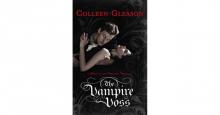 The Vampire Voss
The Vampire Voss Lavender Vows
Lavender Vows Sanctuary of Roses
Sanctuary of Roses A Lily on the Heath
A Lily on the Heath A Whisper Of Rosemary
A Whisper Of Rosemary The Rest Falls Away
The Rest Falls Away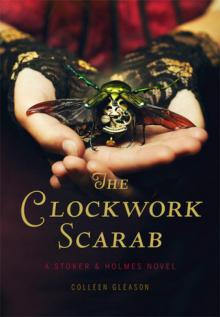 The Clockwork Scarab
The Clockwork Scarab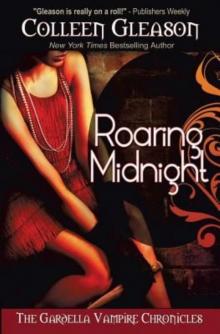 Roaring Midnight
Roaring Midnight The Vampire Dimitri
The Vampire Dimitri Countdown To A Kiss A New Years Eve Anthology
Countdown To A Kiss A New Years Eve Anthology The Vampire Narcise
The Vampire Narcise When Twilight Burns
When Twilight Burns The Bleeding Dusk
The Bleeding Dusk As Shadows Fade
As Shadows Fade Sinister Stage: A Ghost Story Romance and Mystery (Wicks Hollow Book 5)
Sinister Stage: A Ghost Story Romance and Mystery (Wicks Hollow Book 5) Sinister Lang Syne: A Short Holiday Novel (Wicks Hollow)
Sinister Lang Syne: A Short Holiday Novel (Wicks Hollow) Sinister Sanctuary
Sinister Sanctuary Night Beckons
Night Beckons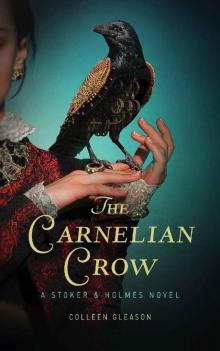 The Carnelian Crow: A Stoker & Holmes Book (Stoker and Holmes 4)
The Carnelian Crow: A Stoker & Holmes Book (Stoker and Holmes 4) The Shop of Shades and Secrets (Modern Gothic Romance 1)
The Shop of Shades and Secrets (Modern Gothic Romance 1) Lavender Vows tmhg-1
Lavender Vows tmhg-1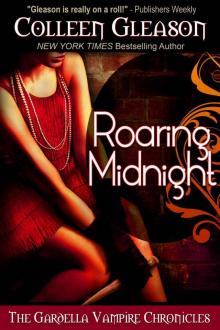 Roaring Midnight (The Gardella Vampire Chronicles | Macey #1)
Roaring Midnight (The Gardella Vampire Chronicles | Macey #1) Lavender Vows (The Medieval Herb Garden Series)
Lavender Vows (The Medieval Herb Garden Series) Dark Secrets: A Paranormal Romance Anthology
Dark Secrets: A Paranormal Romance Anthology Roaring Shadows
Roaring Shadows The Gems of Vice and Greed (Contemporary Gothic Romance Book 3)
The Gems of Vice and Greed (Contemporary Gothic Romance Book 3)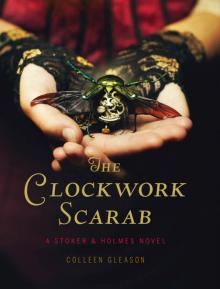 The Clockwork Scarab s&h-1
The Clockwork Scarab s&h-1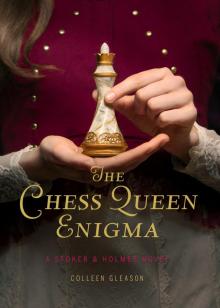 The Chess Queen Enigma
The Chess Queen Enigma Sinister Secrets
Sinister Secrets A Whisper of Rosemary (The Medieval Herb Garden Series)
A Whisper of Rosemary (The Medieval Herb Garden Series) Dark and Damaged: Eight Tortured Heroes of Paranormal Romance: Paranormal Romance Boxed Set
Dark and Damaged: Eight Tortured Heroes of Paranormal Romance: Paranormal Romance Boxed Set Roaring Shadows: Macey Book 2 (The Gardella Vampire Hunters 8)
Roaring Shadows: Macey Book 2 (The Gardella Vampire Hunters 8)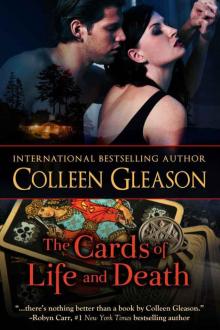 The Cards of Life and Death (Modern Gothic Romance 2)
The Cards of Life and Death (Modern Gothic Romance 2) Roaring Dawn: Macey Book 3 (The Gardella Vampire Hunters 10)
Roaring Dawn: Macey Book 3 (The Gardella Vampire Hunters 10) Sinister Summer
Sinister Summer Sinister Sanctuary: A Ghost Story Romance & Mystery (Wicks Hollow Book 4)
Sinister Sanctuary: A Ghost Story Romance & Mystery (Wicks Hollow Book 4)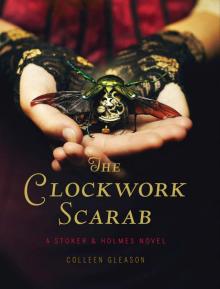 The Clockwork Scarab: A Stoker & Holmes Novel
The Clockwork Scarab: A Stoker & Holmes Novel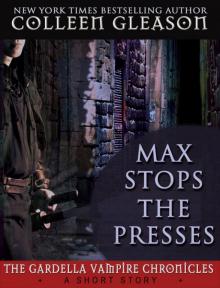 Max Stops the Presses
Max Stops the Presses The Spiritglass Charade
The Spiritglass Charade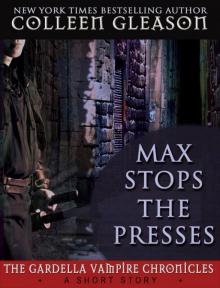 Max Stops the Presses: A Gardella Vampire Chronicles Short Story
Max Stops the Presses: A Gardella Vampire Chronicles Short Story Tempted by the Night
Tempted by the Night